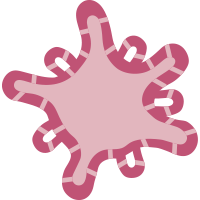
Organoid News
Organoid News is an online resource dedicated to the latest research about and featuring organoids.
Development of an Alginate–Chitosan Biopolymer Composite With dECM Bioink Additive for Organ-on-a-Chip Articular Cartilage
[Scientific Reports] Investigators proposed a novel approach for using a combination of biopolymers and decellularised EC ECM as a bioink additive in the development of scalable organs-on-a-chip using a microfluidic platform.
Research Progress in Hydrogels for Cartilage Organoids
[Advanced Healthcare Materials] Scientists summarize the methods for establishing cartilage organoids and provide an overview of the advantages and limitations of using matrigel in the cultivation of such organoids.
Human Pluripotent Stem Cell-Derived Kidney Organoids Reveal Tubular Epithelial Pathobiology of Heterozygous HNF1B-Associated Dysplastic Kidney Malformations
[Stem Cell Reports] The authors generated heterozygous HNF1B mutant kidney organoids from CRISPR-Cas9 gene-edited human ESCs and induced PSCs reprogrammed from a family with HNF1B-associated dysplastic kidney malformations.
Mouse Neural Tube Organoids Self-Organize Floorplate through BMP-Mediated Cluster Competition
[Developmental Cell] Scientists investigated floorplate self-organization in clonal mouse neural tube organoids. Expression of the floorplate marker FOXA2 was initially spatially scattered before resolving into multiple clusters, which underwent competition and sorting, resulting in a stable “winning” floorplate.
Transmissible Gastroenteritis Virus Induces Inflammatory Responses via RIG-I/NF-κB/HIF-1α/Glycolysis Axis in Intestinal Organoids and In Vivo
[Journal of Virology] The authors found that apical-out organoids were susceptible to transmissible gastroenteritis virus infection (TGEV), and the expression of representative inflammatory cytokines was significantly upregulated upon TGEV infection.
Natural Hydrogels Support Kidney Organoid Generation and Promote In Vitro Angiogenesis
[Advanced Materials] A new method to produce kidney organoids with vascular-like structures was achieved through the assembly of hPSC-derived endothelial-like organoids with kidney organoids in 3D.
hiPSC-Derived Macrophages Improve Drug Sensitivity and Selectivity in a Macrophage-Incorporating Organoid Culture Model
[Biofabrication] Researchers created macrophage-containing organoid co-culture models by directly incorporating hiPSC-derived pre-macrophages into organoid and scaffold cell models.
Trans-Omic Profiling Uncovers Molecular Controls of Early Human Cerebral Organoid Formation
[Cell Reports] To elucidate the molecular programs that drive human brain formation, investigators generated a comprehensive trans-omic map of the phosphoproteome, proteome, and transcriptome of the exit of pluripotency and neural differentiation toward human cerebral organoids.
Reproducible Generation of Human Liver Organoids (HLOs) on a Pillar Plate Platform via Microarray 3D Bioprinting
[Lab On A Chip] Microarray 3D bioprinting, a droplet-based printing technology, was used to generate a large number of small organoids on the pillar plate for predictive hepatotoxicity assays.
Biomimetic Hydrogels with Mesoscale Collagen Architecture for Patient-Derived Tumor Organoids Culture
[Bioactive Materials] Investigators presented a rapid technique for generating collagen bundles with an average length of 90 ± 27 μm and a mean diameter of 5 ± 1.5 μm from tumor tissue debris that underwent mechanical agitation following enzymatic digestion.
Breast Cancer-on-Chip for Patient-Specific Efficacy and Safety Testing of CAR-T Cells
[Cell Stem Cell] Researchers developed a breast cancer-on-chip model with an integrated endothelial barrier that enables the transmigration of perfused immune cells, their infiltration into the tumor, and concomitant monitoring of cytokine release during perfused culture over a period of up to eight days.
Rigor and Reproducibility in Human Brain Organoid Research: Where We Are and Where We Need to Go
[Stem Cell Reports] Investigators review current analytical platforms used to characterize human forebrain cortical organoids, highlight challenges, and propose recommendations for future studies to achieve greater precision and uniformity across laboratories.
Organoids are three-dimensional cell cultures that more accurately model cell behavior, organ function, and pathology than traditional two-dimensional cell culture. Organoid News was launched in 2020 to help scientists stay up-to-date with this revolutionary new research system. Use Organoid News to stay current with the latest applications and discoveries using organoids, as well as new reviews, jobs, news, and upcoming events.

 Cancer Stem Cell News
Cancer Stem Cell News Cell Therapy News
Cell Therapy News Dermal Cell News
Dermal Cell News Endothelial Cell News
Endothelial Cell News ESC & iPSC News
ESC & iPSC News Extracellular Matrix News
Extracellular Matrix News Hematopoiesis News
Hematopoiesis News Hepatic Cell News
Hepatic Cell News Human Immunology News
Human Immunology News Immune Regulation News
Immune Regulation News
 Intestinal Cell News
Intestinal Cell News Mammary Cell News
Mammary Cell News Mesenchymal Cell News
Mesenchymal Cell News Muscle Cell News
Muscle Cell News Neural Cell News
Neural Cell News Organoid News
Organoid News Pancreatic Cell News
Pancreatic Cell News Prostate Cell News
Prostate Cell News Pulmonary Cell News
Pulmonary Cell News
